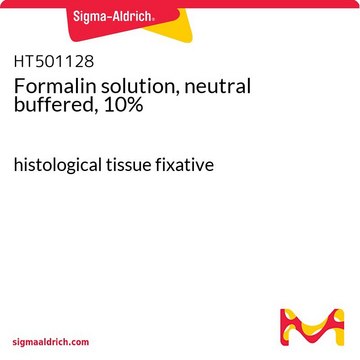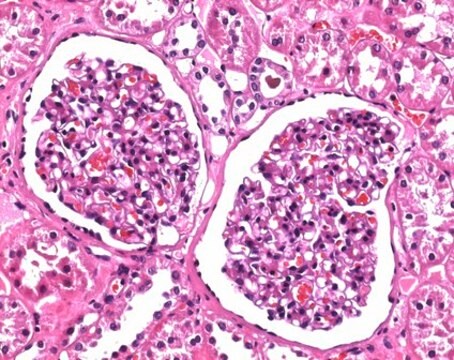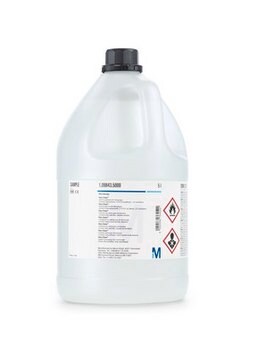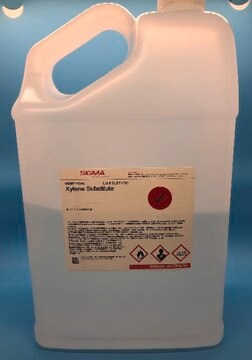A5472
Formalin Free Tissue Fixative
Autenticatiper visualizzare i prezzi riservati alla tua organizzazione & contrattuali
About This Item
Codice UNSPSC:
12171500
NACRES:
NA.47
Prodotti consigliati
Stato
solution
Caratteristiche più verdi
Designing Safer Chemicals
Learn more about the Principles of Green Chemistry.
sustainability
Greener Alternative Product
Colore
colorless
Densità
1.044 g/cm3
applicazioni
hematology
histology
Categoria alternativa più verde
, Aligned
Temperatura di conservazione
room temp
Applicazioni
A formalin-free tissue fixative that is a less toxic alternative to formalin. Performs well with PCR, in-situ hybridization and immunohistological staining.
We are committed to bringing you Greener Alternative Products, which adhere to one or more of The 12 Principles of Greener Chemistry. This product has Inherently Safer Chemistry, compared to the standard use of formalin for tissue processing.
We are committed to bringing you Greener Alternative Products, which adhere to one or more of The 12 Principles of Greener Chemistry. This product has Inherently Safer Chemistry, compared to the standard use of formalin for tissue processing.
Altre note
Alcoholic solution with hydroxylated compounds. The product is ready to use and requires no dilution or preparation.
Avvertenze
Warning
Indicazioni di pericolo
Consigli di prudenza
Classi di pericolo
Flam. Liq. 3
Codice della classe di stoccaggio
3 - Flammable liquids
Classe di pericolosità dell'acqua (WGK)
WGK 3
Punto d’infiammabilità (°F)
118.0 °F
Punto d’infiammabilità (°C)
47.8 °C
Scegli una delle versioni più recenti:
Possiedi già questo prodotto?
I documenti relativi ai prodotti acquistati recentemente sono disponibili nell’Archivio dei documenti.
M E Boon et al.
Biotechnic & histochemistry : official publication of the Biological Stain Commission, 83(6), 261-277 (2008-11-26)
The German, F. Blum, introduced formalin as a fixative in 1893. Formalin rapidly became popular for hardening and preserving gross human and animal specimens. As a result, microscopy for diagnostic pathology by combining paraffin embedding and formalin fixation was developed.
Mee Kum Kim et al.
Journal of Korean medical science, 23(5), 864-869 (2008-10-29)
To compare the stem niche in different culture conditions of limbal epithelial cells, the suspended human limbal epithelial cells (HLECs) were seeded on the 3T3-pretreated plates and the other suspended cells were plated on amniotic membranes (AMs) which were either
Hannelore Kothmaier et al.
Archives of pathology & laboratory medicine, 135(6), 744-752 (2011-06-03)
Formalin-fixed, paraffin-embedded tissue is the routine processing method for diagnostics practiced in pathology departments worldwide. To determine the potential value of non-cross-linking, formalin-free tissue fixation for diagnostics in pathology and proteomic investigations. We tested 3 commercially available, formalin-free tissue fixatives-FineFIX
R Scott Pearsall et al.
Proceedings of the National Academy of Sciences of the United States of America, 105(19), 7082-7087 (2008-05-08)
Diseases that affect the regulation of bone turnover can lead to skeletal fragility and increased fracture risk. Members of the TGF-beta superfamily have been shown to be involved in the regulation of bone mass. Activin A, a TGF-beta signaling ligand
Il team dei nostri ricercatori vanta grande esperienza in tutte le aree della ricerca quali Life Science, scienza dei materiali, sintesi chimica, cromatografia, discipline analitiche, ecc..
Contatta l'Assistenza Tecnica.







